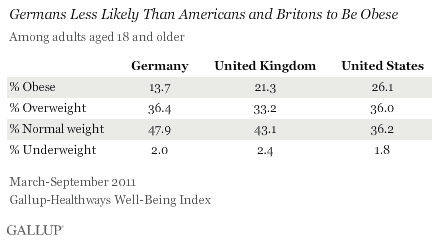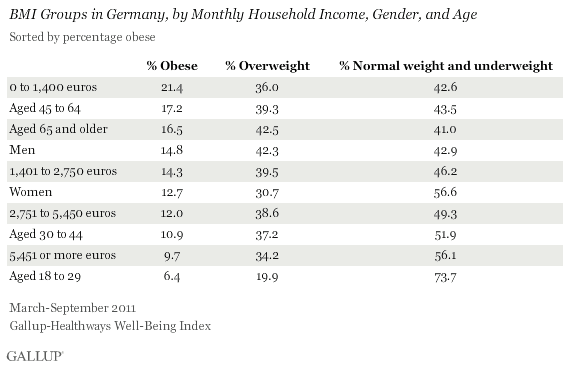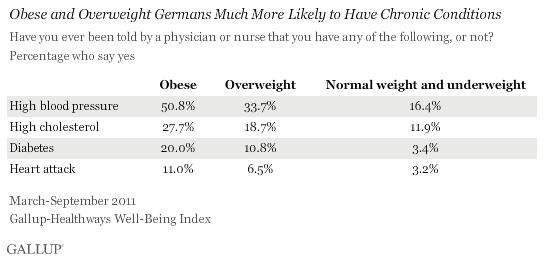BERLIN -- Half of German adults are obese (13.7%) and overweight (36.4%), similar to the 54.5% in the United Kingdom, but significantly less than the 62.1% in the United States.

These data were collected as part of the Gallup-Healthways Well-Being Index from March to September 2011 in Germany, the U.K., and the U.S.
The Gallup-Healthways Well-Being Index uses respondents' self-reports of their height and weight to calculate body mass index (BMI) scores. Individual BMI values of 30 or higher are classified as "obese," 25.0 to 29.9 are "overweight," 18.5 to 24.9 are "normal weight," and 18.4 or less are "underweight."
Low-Income and Older Germans Among Most Likely to Be Obese or Overweight
Low-income adults and those aged 45 and older are among the most likely in Germany to be overweight or obese, while high-income and younger Germans are the least likely. More than 1 in 5 Germans in the lowest income category (1,400 euros or less a month) are obese, compared with about 1 in 10 Germans who earn 5,451 or more euros a month. More than 50% of those aged 45 and older are overweight and obese, compared with 26.3% of those aged 18 to 29.
While German men and women are about equally as likely to be obese, men are significantly more likely than women are to be overweight -- 42.3% vs. 30.7%, respectively. These gender differences hold when controlling for age and income.

Obese and Overweight Adults Much More Likely to Have Chronic Conditions
There is a clear link between obesity and poor health in Germany. Obese Germans are more than twice as likely as normal weight and underweight Germans to have high blood pressure, high cholesterol, and to have suffered a heart attack. Those who are obese are more than six times as likely as those who are normal weight and underweight to have diabetes.

While the linkages between obesity and chronic conditions are well-documented, these data underscore the extent of the obesity problem in Germany. They also mirror what Gallup and Healthways have found in the United States.
Implications
More than half of the adult population in Germany is overweight and obese, making them more likely to suffer from chronic conditions such as high blood pressure, high cholesterol, diabetes, or heart attacks. Low-income Germans and those aged 45 and older are among the most likely to be in this situation.
Obesity and associated chronic conditions are a major drain on individuals, workplaces, and societies. They increase healthcare costs and decrease productivity and overall well-being. Gallup and Healthways have also recently documented the significant costs of obesity and related diseases to workplaces in the U.S. -- more than $153 billion per year -- and the U.K. -- more than 21 billion pounds per year.
German leaders are becoming increasingly aware of and committed to improving their nation's weight problems. For example, there was a recent public debate in Germany and Europe on how to better inform consumers with more appropriate nutritional labeling of food products. Denmark has gone a step further by being the first country to introduce a special tax on food with high saturated fat content. The behavioral data collected through the Gallup-Healthways Well-Being Index can inform this debate with detailed and timely information and thus help leaders in government, business, and civil society shape policies and outcomes that improve Germans' health.
View all Gallup-Healthways Well-Being Index questions and methodology.
About the Gallup-Healthways Well-Being Index
The Gallup-Healthways Well-Being Index tracks well-being in the U.S., U.K., and Germany and provides best-in-class solutions for a healthier world. To learn more, please visit well-beingindex.com.
Survey Methods
Results are based on telephone interviews conducted as part of the Gallup-Healthways Well-Being Index survey from March 7-Sept. 30, 2011, with a random sample of 6,514 adults, aged 18 and older, living in Germany, selected using random-digit-dial sampling.
For results based on the total sample of national adults, one can say with 95% confidence that the maximum margin of sampling error is ±1.62 percentage points.
Interviews are conducted with respondents on landline telephones and cellular phones. Samples are weighted by gender, age, education, region, adults in the household, and cell phone status. Demographic weighting targets are based on the most recently published population data from the German Statistics Office. All reported margins of sampling error include the computed design effects for weighting and sample design.
Results from the U.K. and the U.S. are based on telephone interviews conducted as part of the Gallup-Healthways Well-Being Index survey from March 1-Sept. 30, 2011, with a random sample of 6,295 adults in the U.K. and 200,294 adults in the U.S., aged 18 and older, selected using random-digit-dial sampling.
For results based on the total sample of national adults, one can say with 95% confidence that the maximum margin of sampling error is ±1.45 percentage points in the U.K. and less than ±1 percentage point in the U.S.
In addition to sampling error, question wording and practical difficulties in conducting surveys can introduce error or bias into the findings of public opinion polls.
For more details on Gallup's polling methodology, visit www.gallup.com.
